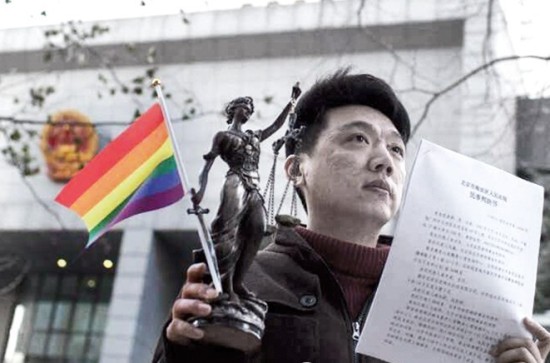
April 1, 2017, by Emmanuele Lazzara
Being a sexual minority in contemporary China: The challenges ahead
Recent years have witnessed increasing media coverage of LGBT-related issues in China. For instance, in 2014, Qiu Bai, a student from Guangdong province, sued the Chinese ministry of education on the grounds that a number of university textbooks described homosexuality as a disorder and advised in favour of shock therapy as a possible cure. After an initial struggle, ministry representatives eventually agreed to meet her to address the issue (Rauhala 2015, BBCa 2016, Staff 2016). This year, Hu Yu, a 32 year old man from Henan Province, sued a hospital for attempting to change his sexual orientation through unorthodox, unscientific, and inhumane practices. The man’s partner claims that Hu was held against his will at the psychiatric clinic after his family members, including his wife, had discovered his sexual orientation. After two weeks of forced hospitalisation, his partner was able to have him released, thanks to the help of human rights lawyer Ah Qiang (Denyer 2016, Jie 2016 , Phillips 2016). A similar lawsuit was filed in Beijing by Xiao Zhen, a man who underwent conversion therapy at a Chongqing-based clinic, due to parental pressure (Davis 2014, Jenkin 2016). Once again, the “therapy” involved hypnotism and electroshock. Xiao Zhen decided to sue the clinic and to take the case even further, by starting a campaign aimed at having these practices banned. Backed by LGBT-rights organisation ‘All Out’, Xiao Zhen’s petition collected 100,000 signatures, and allowed him to meet with representatives of the World Health Organisation (Lopez 2014). Yet, conversion therapy still remains legal in China.
Perhaps, for many, it will come as no surprise that the majority of Chinese society, which in many respects remains strongly conservative and heteronormative, is still unable to accept the existence of same-sex relationships. Recent ethnographic studies have shown that virtually all LGBT people face enormous pressure from the family, due to the imperative of marriage (Kong 2011, Yip Lo Kam 2012, Engebretsen 2014). This is primarily because, in a society in which the responsibility to take care of one’s parents falls primarily or entirely upon oneself, having no offspring is considered practically unacceptable. Consequently, one of the main concerns that parents express upon finding out that their child is LGBT is the possibility that they will have nobody looking after them later in life. Furthermore, bearing children fulfils much more than just a practical role within Chinese society; it is seen as a requirement and expectation, with failure to carry on the family line being seen as the most unfilial of acts (Slote and Vos 1998, Zhou 2000).
But despite the firm belief held by many that family is the greatest obstacle for LGBT people in China, one cannot help but wonder about the impact that the Government’s attitudes to social change and grassroots movements is bearing upon them. Despite the far too often used mantra “no support, no opposition, no promotion” (不支持,不反对,不提倡), which is meant to describe the Chinese government’s official stance on homosexuality, actions aimed at changing social attitudes towards LGBT issues often encounter the authorities’ opposition. For instance, director and activist Fan Popo found himself having to sue SARFT (State Administration of Radio, Film and Television), after his LGBT-themed documentary “Mama Rainbow” had been removed from a streaming website for no apparent reason (Child 2015). Perhaps, a new official stance reflecting the government’s true attitude towards homosexuality is long overdue, or perhaps the word “opposition” as used by the Chinese authorities in this particular instance should be redefined. While it cannot be denied that, in light of the extremely harsh treatment that LGBT people were victims of during the Maoist period (see Li 2006, Ruan 1997

Xiao Zhen, after winning the court case against the clinic which attempted to treat him.
), the state of affairs has improved significantly in the past few decades, it is also hard to deny that the life of denial, coerced silence, and invisibility which Chinese LGBT people are currently forced into is a form of serious social injustice which can no longer be ignored. Even though the number of scholars focusing on Chinese sexual minorities has increased over the years, more needs to be done to sensitize the Chinese population and to ensure that the Chinese government may finally start to address this issue. Based on my own experience as a researcher, I believe social activism aimed at promoting education on these topics can truly have an impact. Moreover, international pressure, also exerted by consistent media coverage, will equally be fundamental in breaking the silence which, if unchallenged, will perpetuate the current attitudes.
About the author: Emmanuele Lazzara is currently a PhD student at the University of Nottingham, researching discrimination against sexual minorities in China and Taiwan.
Sources:
Engebretsen, E. L. (2014) Queer Women in Urban China: An Ethnography. Routledge Research in Gender and Society 37. New York: Routledge.
Kong, T. (2011) Chinese Male Homosexualities; Memba, Tongzhi and Golden Boy. Oxford: Routledge.
Li, Y. (2006) Regulating Male Same-sex Relationships in the People’s Republic of China In: Elaine Jeffreys, ed. Sex and Sexuality in China. Oxford: Routledge, pp. 82–101.
Ruan, F. (1997) China In: D. J. West and R. Green, eds. Sociolegal control of homosexuality: a multi-nation comparison. New York: Plenum Press, pp. 57–66.
Slote, W., and De Vos, G. (1998) Confucianism and the family. Albany, N.Y: State University of New York Press.
Zhou, W.S. (2000) Tongzhi: Politics of Same-Sex Eroticism in Chinese Societies. Birminghamton: Haworth Press.
Yip Lo Kam, L. (2012) Shanghai Lalas Female Tongzhi Communities and Politics in Urban China. Hong Kong: Hong Kong University Press.
Image originally posted on: https://thenanfang.com/homosexual-conversion-therapy-ruled-invalid-by-beijing-court/
No comments yet, fill out a comment to be the first

Leave a Reply